2019最新中考语法专题条件状语从句(讲解练习)
英语语法专题条件状语从句(讲解+练习,无答案)
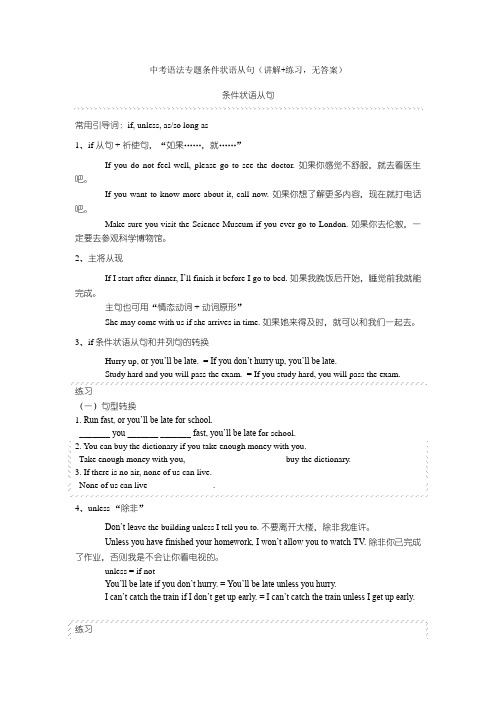
5. I won’t get to the party on time _____ I catch the first train tomorrow morning.
A. IfB. UnlessC. WhetherD. When
6. —Shall we go on a picnic this weekend? —Good idea! Unless it _____.
If I start after dinner, I’ll finish it before I go to bed.如果我晚饭后开始,睡觉前我就能完成。
主句也可用“情态动词+动词原形”
She may come with us if she arrives in time.如果她来得及时,就可以和我们一起去。
If you want to know more about it, call now.如果你想了解更多内容,现在就打电话吧。
Make sure you visit the Science Museum if you ever go to London.如果你去伦敦,一定要去参观科学博物馆。
2、主将从现
2. We will go camping if it _____ tomorrow.
A. Won’t rainB. didn’t rainC. doesn’t rainD. isn’t raining
3. I’m waiting for my friend. If he _____, I _____ swimming alone.
Take enough money with you, _______ _______ _______ buy the dictionary.
中考英语条件状语从句练习题50题(答案解析)
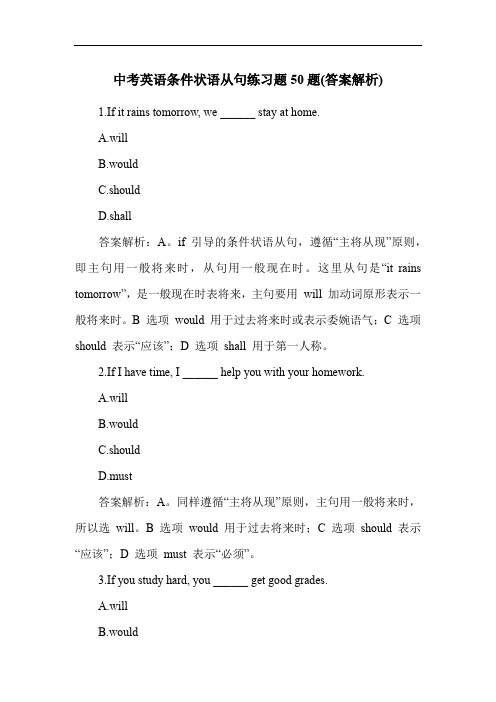
中考英语条件状语从句练习题50题(答案解析)1.If it rains tomorrow, we ______ stay at home.A.willB.wouldC.shouldD.shall答案解析:A。
if 引导的条件状语从句,遵循“主将从现”原则,即主句用一般将来时,从句用一般现在时。
这里从句是“it rains tomorrow”,是一般现在时表将来,主句要用will 加动词原形表示一般将来时。
B 选项would 用于过去将来时或表示委婉语气;C 选项should 表示“应该”;D 选项shall 用于第一人称。
2.If I have time, I ______ help you with your homework.A.willB.wouldC.shouldD.must答案解析:A。
同样遵循“主将从现”原则,主句用一般将来时,所以选will。
B 选项would 用于过去将来时;C 选项should 表示“应该”;D 选项must 表示“必须”。
3.If you study hard, you ______ get good grades.A.willB.wouldC.shouldD.must答案解析:A。
“主将从现”,主句用一般将来时,选will。
B 选项would 用于过去将来时;C 选项should 表示“应该”;D 选项must 表示“必须”。
4.If he ______ early, he can catch the bus.A.gets upB.will get upC.got upD.would get up答案解析:A。
“主将从现”,从句用一般现在时,he 是第三人称单数,所以动词用gets up。
B 选项will get up 是一般将来时,用在主句;C 选项got up 是一般过去时;D 选项would get up 用于过去将来时。
5.If we go to the park, we ______ have a picnic.A.willB.wouldC.shouldD.must答案解析:A。
2019年秋人教版八年级Unit 10 if引导的条件状语从句讲和练(含答案及解析)

2019年秋八年级上册单元语法讲与练if引导的条件状语从句语法精讲1.条件状语从句的含义由一个主句和一个或一个以上的从句构成的句子叫复合句。
在复合句中作状语的句子叫作状语从句。
状语从句根据它表达的意思可分为很多种,if引导的句子在复合句中表示条件,作主句的条件状语,因此称为条件状语从句。
If you don’t hurry,you’ll be late.如果你不快点,你将会迟到的。
If he comes,let me know.如果他要来,通知我。
2.if引导的条件状语从句的结构if引导的条件状语从句在句中的位置比较灵活,可以放在主句之前(这时要和主句用逗号隔开),也可以放在主句的后面(不用逗号)。
条件状语从句的结构为:if+陈述句,主语+谓语(=主语+谓语+if+陈述句)。
意为“如果……就……”。
If you ask him,he will tell you the answer.如果你问他,他就会告诉你答案。
I hope to visit her if I’m free.如果我有空,我希望去看望她。
3.if引导的条件状语从句与主句时态的一致性在复合句中,从句中动词的时态在一定程度上受到主句动词时态的制约,英语语法中称为时态呼应。
(1)在含有条件状语从句的复合句中,如果主句是一般将来时,从句则用一般现在时代替一般将来时表将来。
If it rains,I will stay at home.如果下雨,我将待在家里。
If you study hard,you will pass the examination.如果你努力学习,就能通过这次考试。
(2)如果主句含有must,may,can等情态动词,从句也要用一般现在时。
If you drive too fast,you may have an accident.如果你把车开得太快,你可能会出事故。
You must stop if the traffic light is red.如果红灯亮了,你必须停下来。
中考英语条件状语从句练习题50题(答案解析)

中考英语条件状语从句练习题50题(答案解析)1. If it ______ tomorrow, we will have a picnic in the park.A. don't rainB. doesn't rainC. won't rainD. not rain答案:B。
解析:在条件状语从句中,如果主句是一般将来时,从句要用一般现在时表将来。
这里it是第三人称单数,否定形式应该是doesn't rain,A选项don't用于第一、二人称和复数主语;C选项won't rain是一般将来时,不符合条件状语从句的时态要求;D选项not rain形式错误。
2. I will call you ______ I get home.A. as soon asB. untilC. whileD. since答案:A。
解析:as soon as表示“一……就……”,句意为我一到家就给你打电话,符合逻辑。
until表示“直到……”,如果用until,句子逻辑不通;while表示“当……的时候”,强调两个动作同时进行,在这里不合适;since表示“自从;既然”,不符合句子语境。
3. You can't pass the exam ______ you study hard.A. ifB. unlessC. whenD. after答案:B。
解析:unless等于if not,表示“除非,如果不”,句意为你不能通过考试,除非你努力学习。
if表示“如果”,逻辑与句子不符;when表示“当……的时候”;after表示“在……之后”,这三个选项都不能准确表达句子的逻辑关系。
4. ______ he comes back, please let me know.A. WhereB. HowC. WhenD. Why答案:C。
解析:when引导条件状语从句,表示“当……的时候”,句意为当他回来的时候,请告诉我。
最新2019中考英语专题讲练 状语从句(含解析)
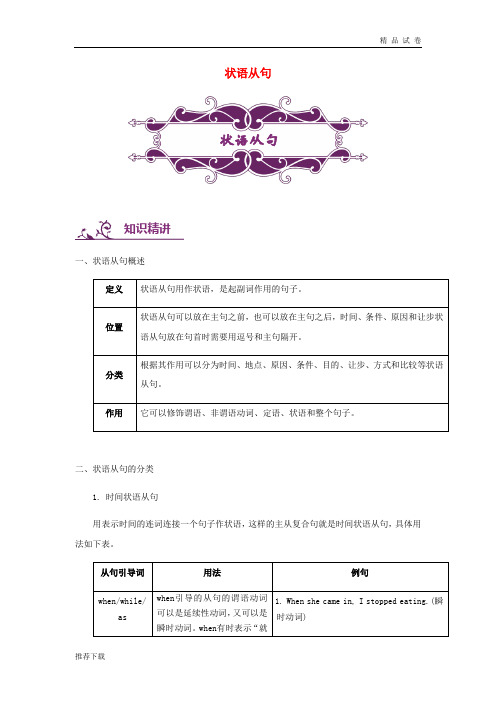
状语从句状语从句知识精讲一、状语从句概述二、状语从句的分类1. 时间状语从句用表示时间的连词连接一个句子作状语,这样的主从复合句就是时间状语从句,具体用法如下表。
2. 结果状语从句结果状语从句的从句部分是补充说明主句中谓语动词发生的结果的,通常位于主句之后。
引导结果状语从句的从属连词如下表。
3. 目的状语从句:从句部分是用以补充说明主句中谓语动词发生的目的。
1). so that 以便……(达到某种目的)如:You must speak louder so that you can be heard by all.你要大点声说,这样大家就都能听到你了。
2). in order that 为了……,如:She got up early in order that she could get to school on time.=She got up early in order to get to school on time.为了能够准时到校,她很早起床。
4. 条件状语从句由连接词if或unless引导的状语从句叫做条件状语从句。
注意:1). unless 从句里的谓语只能是肯定式,因为unless本身表示否定;unless=if not,如:Let's go out for a walk unless you are too tired. =If you are not too tired, let's go out for a walk.如果你不是很累,我们出去散个步吧。
2). 在真实条件句中,主句不能用be going to表示将来,该用shall, will.如:If you will(愿意) wait a minute, I’ll go and tell my mother that you are here.如果你愿意等一分钟,我将去告诉我妈妈你在这里。
3). 下列从句中的will不是将来时助动词,而是情态动词。
2019年八年级英语上册if引导的条件状语从句讲义(新版)人教新目标版

if 引导的条件状语从句(讲义)状语用来表示行为发生的时间、地点、目的、方式、程度等,通常由副词或介词短语充当,也可由一个句子充当。
I slept at home yesterday because I had a bad cold.状语从句状语从句指句子作状语。
根据其作用可分为时间、地点、原因、条件、目的、结果、让步、方式等从句。
状语从句一般由连词(从属连词)引导。
I will go to school by bike tomorrow if it is sunny.Grammar focus—I think I’ll take the bus to the party.—If you do, you’ll be late.If you take the bus to the party, you’ll be late.—I think I’ll stay at home.—If you do, you’ll be sorry.If you stay at home, you’ll besorry.—What will happen if they have the party today?—If they have it today, half the class won’t come.—Should we ask people to bring food?—If we ask people to bring food, they’ll just bring potato chips and chocolate.1.if 在本单元句中意为“;”,用于引导。
即 if 引导的是一个完整的句子,所以一定要有主谓,成为从句,另一个句子则成为主句。
If you go there, I’ll go, too.We will go hiking if it doesn’t rain tomorrow.If Bob leaves tomorrow, I will hold a party for him tonight.2.if 引导的条件状语从句既可以放在主句前,也可放在主句后。
中考英语条件状语从句练习题50题含答案解析
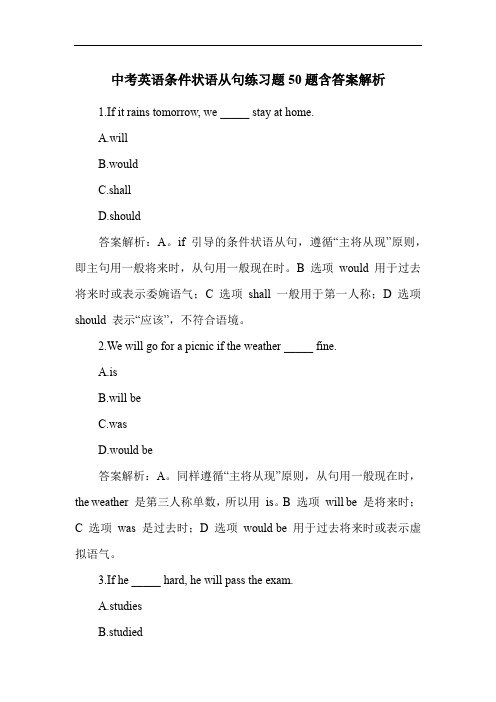
中考英语条件状语从句练习题50题含答案解析1.If it rains tomorrow, we _____ stay at home.A.willB.wouldC.shallD.should答案解析:A。
if 引导的条件状语从句,遵循“主将从现”原则,即主句用一般将来时,从句用一般现在时。
B 选项would 用于过去将来时或表示委婉语气;C 选项shall 一般用于第一人称;D 选项should 表示“应该”,不符合语境。
2.We will go for a picnic if the weather _____ fine.A.isB.will beC.wasD.would be答案解析:A。
同样遵循“主将从现”原则,从句用一般现在时,the weather 是第三人称单数,所以用is。
B 选项will be 是将来时;C 选项was 是过去时;D 选项would be 用于过去将来时或表示虚拟语气。
3.If he _____ hard, he will pass the exam.A.studiesB.studiedC.will studyD.would study答案解析:A。
“主将从现”,从句用一般现在时,he 是第三人称单数,studies 正确。
B 选项studied 是过去时;C 选项will study 是将来时;D 选项would study 用于过去将来时或表示虚拟语气。
4.I will go shopping with you if I _____ free.A.amB.will beC.wasD.would be答案解析:A。
“主将从现”,从句用一般现在时,I 后面用am。
B 选项will be 是将来时;C 选项was 是过去时;D 选项would be 用于过去将来时或表示虚拟语气。
5.If she _____ early, she can catch the bus.A.gets upB.got upC.will get upD.would get up答案解析:A。
【教育文档】2019中考英语二轮复习 状语从句综合复习及练习.doc

状语从句状语从句考点讲解以及针对性训练(时间,条件,原因,地点,结果,比较,让步,目的状语从句的用法)时间状语从句【经典剖析】1.时间状语从句用一般现在时表示将来。
连接时间状语从句的连接词有:when(当……的时候),while(当……的时候),as(当……的时候),once( 一旦),till( until)(一直到……,直到……才),by the time(到……时),as soonas(一……就)the moment(一……就).since(自从……).before(在……前).after(左……后)2.when,while,as均可表示“当……的时候”。
when强调“特定时间”,表示主句谓语动词的动作与从句谓语动词的动作是同时发生的,或从句的动作发生在主句的动作之前;while表示的时间是一段,而不是一点,as多用在口语中,强调“同一时间”或“一前一后”,有时还有“随着”的含义。
I'll go on with the work when/come back tomorrow.我明天回来后会继续做我的工作。
When spring came, he felt like a trip.春天来了,他想去旅游。
When he was eating his breakfast, he heard the doorbell ring.(强调吃饭的时候)。
While he was eating his breakfast, he heard the doorbell ring.(强调吃饭的过程中)While I was studying, you fell asleep.当我学习的时候,你睡着了。
Just as he was speaking, there was a loud explosion.正当他要说话时,传来很大的爆炸声。
As I was going out, it began to rain.(强调两个动作先后发生)As spring warms the good earth,all flowers begin to bloom.(as有“随着”的含义)3.till/until,表示“一直到……”,主从句都用肯定式;表示“直到……才”,主句否定,从句肯定。
最新中考语法专题条件状语从句(讲解练习)
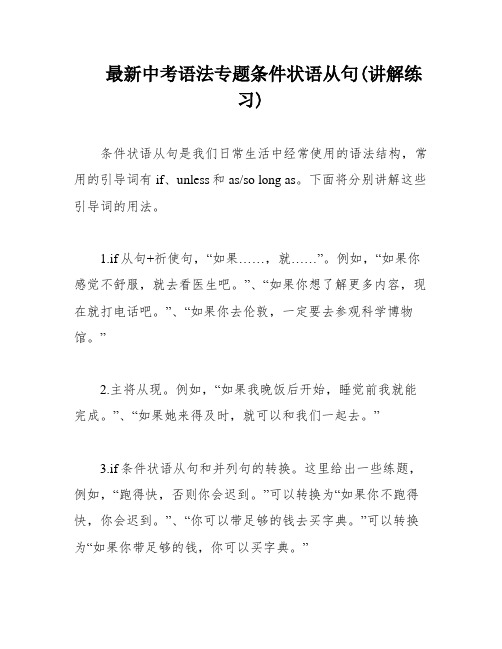
最新中考语法专题条件状语从句(讲解练习)条件状语从句是我们日常生活中经常使用的语法结构,常用的引导词有if、unless和as/so long as。
下面将分别讲解这些引导词的用法。
1.if从句+祈使句,“如果……,就……”。
例如,“如果你感觉不舒服,就去看医生吧。
”、“如果你想了解更多内容,现在就打电话吧。
”、“如果你去伦敦,一定要去参观科学博物馆。
”2.主将从现。
例如,“如果我晚饭后开始,睡觉前我就能完成。
”、“如果她来得及时,就可以和我们一起去。
”3.if条件状语从句和并列句的转换。
这里给出一些练题,例如,“跑得快,否则你会迟到。
”可以转换为“如果你不跑得快,你会迟到。
”、“你可以带足够的钱去买字典。
”可以转换为“如果你带足够的钱,你可以买字典。
”4.XXX“除非”。
例如,“不要离开大楼,除非我准许。
”、“除非你已完成了作业,否则我不允许你看电视。
”最后,还有一个常用的转换方法,就是将if从句转换为否定句,例如“赶快,否则你会迟到。
”可以转换为“如果你不赶快,你会迟到。
”If he wants to see me。
you can tell him to wait.2.You’ll be in trouble ________ XXX.XXX on time。
you’ll be in trouble.3.________ you study hard。
you will pass the test.If you study hard。
you will pass the test.4.I won’t be able to come to the party ________ I finish this project.Unless I finish this project。
I won’t be able to come to the party.5.You can borrow my bike ________ you promise to bring it back before 5pm.XXX it back before 5pm.。
2019届中考英语复习第二篇中考语法专项第32课状语从句课后练习201903191137

课后练习32 状语从句温馨提示:为满足部分老师批改时的评估需要,本课时的题量已按满分100分来设置,请需要的老师自行规划。
一、用适当的连词(词组)填空1. Savannah was moved by the risks they faced,____________ she made 200 “thank-you”cards for them.2. You can do everything well____________ you put your heart into it.3. I haven’t heard from him____________ he went to America.4. We won’t give up____________ we have failed ten times.5. I’ll tell her about the important news____________ I see her.6. He got a job at the airport____________ he’d left school.7.____________ all of them were reading in the classroom, a boy ran into it quickly.8. Were you writing____________ the teacher came in?9.____________ years go by, China is getting stronger and richer.10. He didn’t go to bed____________ he finished all his work.11. There are heavy clouds in the sky____________ it is going to rain.二、用方框中所给词或词组的适当形式填空,每个词或词组限用一次wherever even though finishno matter how as soon as1. —Will you go to the movies with me?—Not until I have____________ my homework.2.____________ well you drive, you must drive carefully.3. I will never forget that terrible accident____________ it happened so long ago.4.____________ you go, you can always get help from others.5. He will come here right away____________ he hears the news.三、句型转换1. Jack is so short that he can’t reach the book on the shelf. (改为同义句)Jack is____________ short to reach the book on the shelf.2. The teacher began his class. All the students were seated.(用not...until合并为一句)The teacher_______________________ his class____________ all the students were seated.3. Hurry up, or you’ll miss the early bus. (改为同义句)____________you____________ hurry up, you____________catch the early bus.4. The children have to stay inside because of the hot weather. (改为状语从句)The children have to stay inside______________________________________________ hot.5. Miss Gao wrote a letter to her friend at once after she had got to Shanghai. (改为同义句)Miss Gao__________a letter to her friend____________________________she__________ Shanghai.四、阅读理解(2018·宁波市南山县区模拟)Why do Americans worry about their weight, while the French, who eat rich food, continue to stay thin? Now a study by Cornel University suggests how life-style and decision about eating may affect(影响)weight. Scientists say that the French tend to(倾向于)stop eating when they feel full. However, Americans tend to stop when their plate is empty or their favorite TV show is over.According to Dr. Joseph Mercola, a health expert, the French see eating as an important part of their lifestyle. They enjoy food and spend a long time at the table, while Americans see eating as something to be squeezed(挤压)between the other daily activities. Mercola believes Americans lose the ability to sense when they are actually full. So they keep eating after the French have stopped. He also points out that Americans drive to huge supermarkets to buy canned(罐装的)and frozen foods for the week. The French, instead, tend to shop daily, walking to small shops and farmers’markets. They can buy fresh fruit, vegetables, eggs and very good meat for each meal.After a visit to the United States, Mireille Guiliano, author of French Women Don’t Get Fat, decided to write about the importance of knowing when to stop rather than suggest how to avoid food. Today she con-tinues to stay thin and hardly goes to the gym.Meanwhile, the research also shows that recent lifestyle changes may be affecting French eating habits.Today the rate of obesity(肥胖率)—or very overweight—among adults is only 6%. However, as American food gets popular and the young French say no to the old traditions, the obesity rate among French children has reached 17%—and is growing.()1. In what ways are the French different from Americans according to Dr. Joseph Mercola?A. The French go shopping at supermarket more often.B. The French squeeze eating between the other activities.C. The French regard eating as a key part of lifestyle.D. The French usually eat too much canned and frozen food.()2. Compared with the adults, the French children get____________ .A. fatterB. thinnerC. healthierD. lazier()3. This text is mainly about____________.A. Americans and the FrenchB. lifestyle and obesityC. children and adultsD. fast food and overweight()4. Where is this passage probably taken from?A. A TV interview.B. A food advertisement.C. A health report.D. A book review.五、根据短文内容和所给汉语提示,在空白处写出单词的正确形式。
条件壮语从句语法讲解和习题巩固(附答案)

If you go to the party, you’ll have a great time! 语法讲解和习题巩固(附答案)条件状语从句条件状语从句表示主句动作发生的条件,在初中阶段常由if(如果)和unless引导,表示假如有从句的动作发生就会有主句的动作发生。
例如:Please call me if he is at home.假如他在家的话,请给我打电话。
:一、if条件句if条件句:条件句用于陈述语气,表示假设的情况可能发生,其中if 是―如果‖的意思。
构成条件从句主句时态If+一般现在时主语+shall/will+动词原形例句If he comes, he will take us to the zoo.用法:(一)条件状语从句通常由连词if引导,意为―如果、假如‖,主句不能用be going to表示将来,而应该用shall,will。
If you leave now, you are never going to remember it. (错误)If you leave now, you will never remember it. (正确)if ―如果‖,引导条件状语从句,主句用一般将来时,从句则用一般现在时,如:If it rains tomorrow, I won't climb the hills.另外,主句是祈使句或含有情态动词,从句也用一般现在时。
如:Please call me if he comes next Sunday. Can you call the policeman if you are in the trouble. 注意宾语从句中的if与条件状语从句if的区别。
宾语从句中的if的意思是―是否‖,相当于whether,引导宾语从句,时态需根据语境确定。
如果主句用一般现在时,从句可以根据具体情况选用任何时态,通常情况下,如果主句用一般过去时,从句必须用过去式的某种形式。
中考英语条件状语从句分析练习题40题
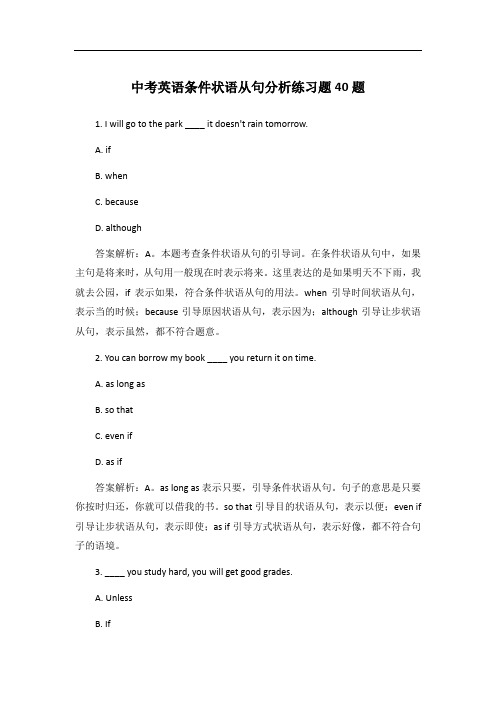
中考英语条件状语从句分析练习题40题1. I will go to the park ____ it doesn't rain tomorrow.A. ifB. whenC. becauseD. although答案解析:A。
本题考查条件状语从句的引导词。
在条件状语从句中,如果主句是将来时,从句用一般现在时表示将来。
这里表达的是如果明天不下雨,我就去公园,if表示如果,符合条件状语从句的用法。
when引导时间状语从句,表示当的时候;because引导原因状语从句,表示因为;although引导让步状语从句,表示虽然,都不符合题意。
2. You can borrow my book ____ you return it on time.A. as long asB. so thatC. even ifD. as if答案解析:A。
as long as表示只要,引导条件状语从句。
句子的意思是只要你按时归还,你就可以借我的书。
so that引导目的状语从句,表示以便;even if 引导让步状语从句,表示即使;as if引导方式状语从句,表示好像,都不符合句子的语境。
3. ____ you study hard, you will get good grades.A. UnlessB. IfC. SinceD. While答案解析:B。
if引导条件状语从句,如果的意思。
句子说如果你努力学习,你就会取得好成绩。
unless表示除非,如果不,与句子意思不符;since引导原因状语从句,自从,因为的意思;while引导时间状语从句,当的时候,或者表示对比关系,都不符合本题要求。
4. She will call you ____ she arrives at the airport.A. as soon asB. untilC. beforeD. after答案解析:A。
as soon as引导条件状语从句,表示一就。
初中条件状语从句(附答案)(整理)
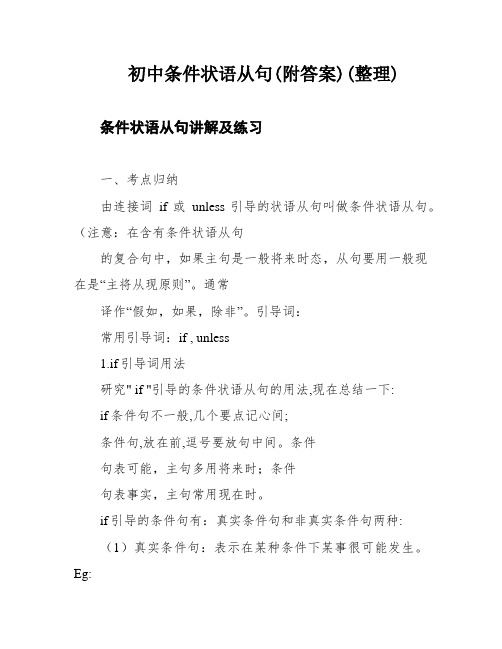
初中条件状语从句(附答案)(整理)条件状语从句讲解及练习一、考点归纳由连接词if或unless引导的状语从句叫做条件状语从句。
(注意:在含有条件状语从句的复合句中,如果主句是一般将来时态,从句要用一般现在是“主将从现原则”。
通常译作“假如,如果,除非”。
引导词:常用引导词:if , unless1.if引导词用法研究" if "引导的条件状语从句的用法,现在总结一下:if条件句不一般,几个要点记心间;条件句,放在前,逗号要放句中间。
条件句表可能,主句多用将来时;条件句表事实,主句常用现在时。
if引导的条件句有:真实条件句和非真实条件句两种:(1)真实条件句:表示在某种条件下某事很可能发生。
Eg:a)If you ask him, he will help you.假定你请他协助,他会帮你的。
b)If you fail in the exam, you will let him down.假定你测验不合格,你会让他扫兴的。
c)If it rains tomorrow, wewon’tgo on a picnic.假定明世界雨,我们就不去野餐。
留意:切记紧随着if的那句话是从句。
(2)非实在前提句是虚拟语气的一种,透露表现与究竟相反,不成完成的前提或基本不成能存在的前提,也就是一种虚拟的前提或假定,从句多用普通曩昔时或曩昔完成时。
Eg:a)If I were you, I would invite him to the party.假定我是你,我会约请他加入集会。
b)I would have arrived much earlier if I had not been caught in the traffic.如果没有堵车,我会到的早一点儿。
c)If I were you, I would go with him.如果我是你,我会和他一起去的。
2.unless引导词用法(1)牢固搭配:unless = if...not除非,若不,除非在……的时分。
初中条件状语从句 精讲和练习含答案

初中英语:条件状语从句一.条件状语从句的概念条件状语从句,即在某种条件下,一件事情可能发生。
在英语中由连接词if或unless等引导的状语从句叫做条件状语从句。
条件是指某一件事情实现之后(状语从句中),一件事情(主句)才能发生,通常译作“假如,只要,如果”等意思。
条件状语从句中,主从句的时态要遵循“主将从现”的原则。
即,主句是将来时态时,从句用一般现在时代替将来时态。
二.条件状语从句的引导词1.If conj . 如果,假如If you ask him,he will help you.如果你请他帮忙,他会帮你的。
If you fail in the exam,you will let him down.如果你考试不及格,你会让他失望的。
2.unless conj.除非,若不,除非在……的时候(if ...not...)You will fail to arrive there in time unless you start earlier. 如果你不早点动身,你就不能及时赶到那儿。
Unless it rains, the game will be played. 除非下雨,比赛将照常进行。
3.so/as long as conj.只要You may borrow my book as long as you keep it clean.只要你保持书的清洁,你就可以把我的书借去。
三.关于条件句的时态,常见的有以下三种情况:1、条件状语从句的主句是一般将来时,那么从句常常用一般现在时。
When I grow up, I’ll be a nurse and look after patients. 我长大后要当一名护士,照顾病人。
2、如果主句是祈使句,那么从句通常要用一般现在时。
If you want to have a chat ,call me up. 如果你想聊天,打我电话。
3、如果主句是含有情态动词时,根据需要从句多用一般现在时。
中考英语条件状语从句分析练习题40题含答案解析
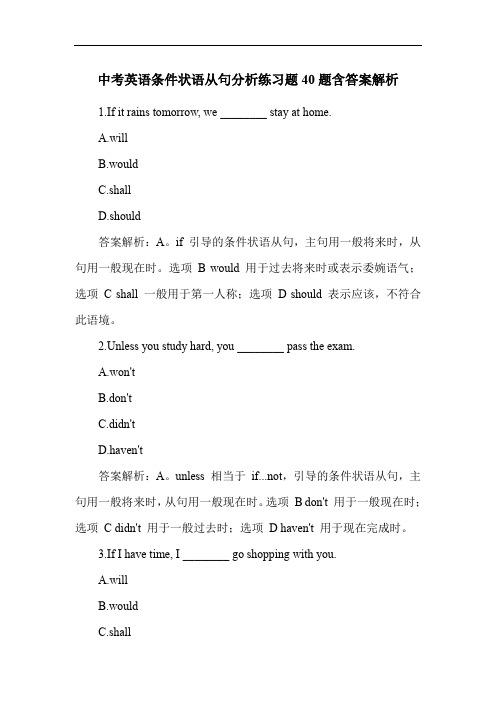
中考英语条件状语从句分析练习题40题含答案解析1.If it rains tomorrow, we ________ stay at home.A.willB.wouldC.shallD.should答案解析:A。
if 引导的条件状语从句,主句用一般将来时,从句用一般现在时。
选项 B would 用于过去将来时或表示委婉语气;选项C shall 一般用于第一人称;选项D should 表示应该,不符合此语境。
2.Unless you study hard, you ________ pass the exam.A.won'tB.don'tC.didn'tD.haven't答案解析:A。
unless 相当于if...not,引导的条件状语从句,主句用一般将来时,从句用一般现在时。
选项B don't 用于一般现在时;选项C didn't 用于一般过去时;选项D haven't 用于现在完成时。
3.If I have time, I ________ go shopping with you.A.willB.wouldC.shallD.should答案解析:A。
if 引导的条件状语从句,主句用一般将来时,从句用一般现在时。
选项 B would 用于过去将来时或表示委婉语气;选项C shall 一般用于第一人称;选项D should 表示应该,不符合此语境。
4.Unless you hurry up, you ________ miss the bus.A.willB.wouldC.shallD.should答案解析:A。
unless 相当于if...not,引导的条件状语从句,主句用一般将来时,从句用一般现在时。
选项 B would 用于过去将来时或表示委婉语气;选项C shall 一般用于第一人称;选项D should 表示应该,不符合此语境。
初中条件状语从句精讲和练习含答案资料讲解

此文档仅供收集于网络,如有侵权请联系网站删除初中英语:条件状语从句一.条件状语从句的概念等或条件状语从句,即在某种条件下,一件事情可能发生。
在英语中由连接词ifunless引导的状语从句叫做条件状语从句。
条件是指某一件事情实现之后(状语从句中),一件事等意思。
条件状语从句中,主从句的时“假如,只要,如果”情(主句)才能发生,通常译作主将从现”的原则。
即,主句是将来时态时,从句用一般现在时代替将来时态。
态要遵循“二.条件状语从句的引导词 conj . 如果,假如1.If如果你请他帮忙,他会帮你的。
If you ask him,he will help you.如果你考试不及格,你会让他失望的。
,you will let him down.If you fail in the examif ...not...)(除非在……的时候 2.unless conj.除非,若不,你就不能及时赶到那儿。
You will fail to arrive there in time unless you start earlier. 如果你不早点动身, ,比赛将照常进行。
Unless it rains, the game will be played. 除非下雨3.so/as long as conj.只要You may borrow my book as long as you keep it clean.只要你保持书的清洁,你就可以把我的书借去。
三.关于条件句的时态,常见的有以下三种情况:1、条件状语从句的主句是一般将来时,那么从句常常用一般现在时。
When I grow up, I'll be a nurse and look after patients. 我长大后要当一名护士,照顾病人。
2、如果主句是祈使句,那么从句通常要用一般现在时。
If you want to have a chat ,call me up. 如果你想聊天,打我电话。
2019中考英语:名师点拨语法及提分练习题解析第15篇(地点、条件、原因、目的状语从句).doc

2019中考英语:名师点拨语法及提分练习题解析第15篇(地点、条件、原因、目的状语从句)注意事项:认真阅读理解,结合历年的真题,总结经验,查找不足!重在审题,多思考,多理解!【一】地点状语从句概念:地点状语从句(adverbialclauseofplace)地点状语从句一般由连接副词where,wherever等引导,已经形成了固定的句型,要点:由连词where和复合关系词wherever(=nomatterwhere)引导.例如:句型1:Where+地点从句,〔there〕+主句。
【注意】此句型通常译成“哪里……哪里就……”;主句在从句后面时,there可用可不用;如果主句在从句的前面时,一般都不用there。
例如:Wherethereisnorain,farmingisdifficultorimpossible.在没有雨水的地方,耕作是困难的,或根本不可能的。
Theyweregoodpersons.Wheretheywent,theretheywerewarmlywelcomed.他们都是好人。
因此他们走到哪里都受到热烈欢迎。
Youshouldhaveputthebookwhereyoufoundit.你本来应该把书放回原来的地方。
WheretheCommunistPartyofChinagoes,therethepeopleareliberated.哪里有了中国共产党,哪里人民得解放。
句型2:Anywhere/wherever+地点从句,+主句。
【注意】anywhere本身是个副词,但是,常可以引导从句,相当于连词,意思相似于wherever,anywhere引导的从句可位于主句之前,也可以位于主句之后。
而wherever 本身就是个连词,表示“在何处,无论何处”。
例如:Wherevertheseais,youwillfindseamen.有海就有海员。
知识扩展1.Wherethereisawill,thereisaway.有志者事竟成。
中考英语专题14:状语从句 (原题版+解析版)(上海专用)

5.(2018·上海·中考真题)Mr Black walked around and offered help. we were doing an
experiment
A. while
B. although
C. until
D. unless
6.(2017·上海·中考真题)The two companies decided to work together. they had
2. You won't pass the exam unless you work hard on it. 3. As long as you take my advice, you will outwit your rival.
4. If there is no water, the fish may die.
注意:主将/情/祈 从现;
12. When the lights are red, the traffic must stop.
主句为一般过去时,从句也要用 13. Please don't go to bed before you finish your homework.
过去时态
14.I liked reading when I was young.
common interest. A. because
B. unless
C. but
D. or
7.(2016-上海.中考真题)The nurse won't leave her patients.
she's sure they are all
taken good care of.
A. unless
B. because
3. since 既然
- 1、下载文档前请自行甄别文档内容的完整性,平台不提供额外的编辑、内容补充、找答案等附加服务。
- 2、"仅部分预览"的文档,不可在线预览部分如存在完整性等问题,可反馈申请退款(可完整预览的文档不适用该条件!)。
- 3、如文档侵犯您的权益,请联系客服反馈,我们会尽快为您处理(人工客服工作时间:9:00-18:30)。
条件状语从句常用引导词:if, unless, as/so long as1、if 从句+ 祈使句,“如果……,就……”If you do not feel well, please go to see the doctor. 如果你感觉不舒服,就去看医生吧。
If you want to know more about it, call now. 如果你想了解更多内容,现在就打电话吧。
Make sure you visit the Science Museum if you ever go to London. 如果你去伦敦,一定要去参观科学博物馆。
2、主将从现If I start after dinner, I’ll finish it before I go to bed. 如果我晚饭后开始,睡觉前我就能完成。
主句也可用“情态动词+ 动词原形”She may come with us if she arrives in time. 如果她来得及时,就可以和我们一起去。
3、if条件状语从句和并列句的转换Hurry up, or you’ll be late. = If you don’t hurry up, you’ll be late.Study hard and you will pass the exam. = If you study hard, you will pass the exam.练习(一)句型转换1. Run fast, or you’ll be late for school._______ you _______ _______ fast, you’ll be late for school.2. You can buy the dictionary if you take enough money with you.Take enough money with you, _______ _______ _______ buy the dictionary.3. If there is no air, none of us can live.None of us can live _______ _______.4、unless “除非”Don’t leave the building unless I tell you to. 不要离开大楼,除非我准许。
Unless you have finish ed your homework, I won’t allow you to watch TV. 除非你已完成了作业,否则我是不会让你看电视的。
unless = if notYou’ll be late if you don’t hurry. = You’ll be late unles s you hurry.I can’t catch the train if I don’t get up early. = I can’t catch the train unless I get up early.练习(一)if not与unless相互替换1. He will not go unless I come with her._____________________________________________2. If you don’t finish it, I will be angry._____________________________________________3. Unless I am mistaken, I’ve seen that man before._____________________________________________4. You won’t get a good job, unless you work hard._____________________________________________5. Unless the strike has been called off, there will be no trains tomorrow.__________________________________________________________5、as/so long as 只要You may use my dictionary as/so long as you don’t keep it too long.只要使用时间不太长,你可以用我的词典。
You can take my car as/so long as you drive carefully. 你可以用我的汽车,只要你小心点儿开。
练习(一)用if或unless填空1. ________ he wants to see me, you can tell him to wait.2. ________ it snows tomorrow, we’ll have a day or two off.3. We won’t go to his party ________ he invites us.4. She is sure to pass the examination ________ she is ill.5. I’ll take that computer ________ I have enough money.6. ________ my grandma wears glasses, she can see better.7. I won’t buy that backpack ________ it costs less than $208. ________ I’m tired; I’ll have a rest for tea.9. You won’t get paid for time off ________ you have a doctor’s note.10. You will get a toothache ________ you do clean your teeth regularly.(二)用所给单词的适当形式填空1. If he ________ (get) a low mark in the test, he ________ (study) harder.2. If you ________ (swim) every day this summer, you ________ (be) very healthy.3. If he ________ (not hurry), he ________ (not see) the beginning of the match.4. You can’t go out unless you ________ (finish) your homework.5. Unless I save my money carefully, I ________ (not be) able to buy a football.6. If it ________ (not rain) tomorrow, we ________ (go) to the park.7. If he ________ (return) to the school, I ________ (let) you know.8. He ________ smoke unless he ________ (have) enough money.9. They can remember it better if someone ________ (give) them some advice about it.10. The man ________ (set off) if he ________ (buy) the air ticket.(三)单项填空1. If I _____ his phone number, I will tell you.A. findB. foundC. will findD. have found2. We will go camping if it _____ tomorrow.A. Won’t rainB. didn’t rainC. doesn’t rainD. isn’t raining3. I’m waiting for my friend. If he _____, I _____ swimming alone.A. doesn’t come; will goB. won’t come; will goC. will come; won’t goD. don’t come; will go4. _____ you go to the supermarket at 7 p.m., you can buy a lot of cheap food.A. IfB. UnlessC. WhetherD. When5. I won’t get to the party on time _____ I catch the first train tomorrow morning.A. IfB. UnlessC. WhetherD. When6. —Shall we go on a picnic this weekend? —Good idea! Unless it _____.A. rainsB. doesn’t rainC. rainD. won’t rain7. —Can I change the jacket for another one _____ it doesn’t fit me well? —Of course.A. unlessB. ifC. thatD. though8. Nobody can learn maths well _____ he works hard on it.A ifB unlessC thoughtD however9. If fish _____ away from water, they _____ die.A are taking, won’tB are taken, willC are being taken, willD take, won’t10. Each student can ask teachers for help if he _____ how to work out the problem.A will knowB won’t knowC don’t knowD doesn’t know。
